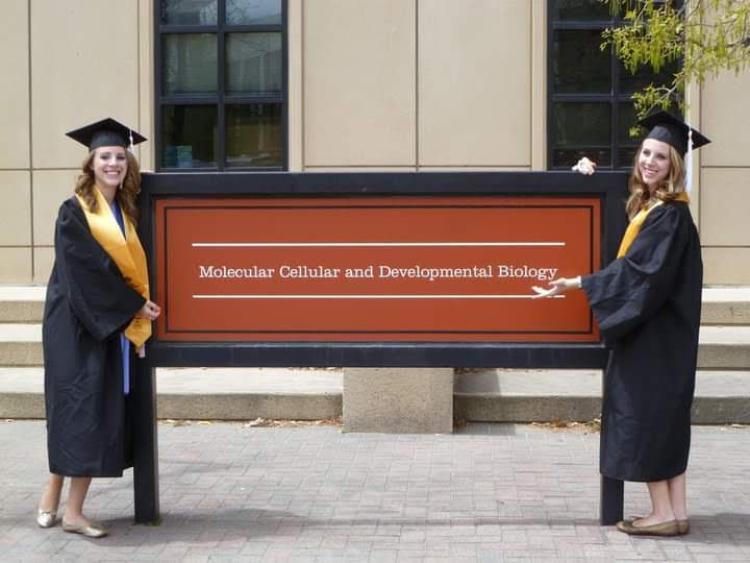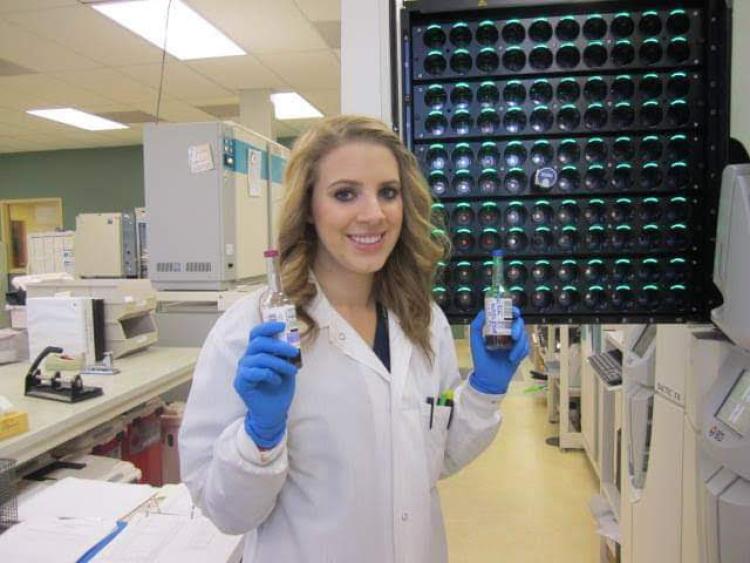Testing mettle on the frontlines
Twin CU Boulder graduates, lab scientists, crucial to battling COVID-19
Nobody was particularly surprised when the Faliano twins, Cara and Amy, both decided to go into science. After all, they’d both been fascinated with science while growing up in northwest Denver, taking books out of the library on astronomy, dinosaurs, meteorology—you name it. They even dressed up as scientists for Halloween.
“We went through a real hard meteorology phase,” Cara says. “We spent a whole summer watching the Weather Channel.”
You don’t have to go to medical school or nursing school to be able to use your science education in health care,"
It also didn’t really shock anyone that after graduating from Denver East High School, these first-generation college students chose the University of Colorado Boulder, the state’s flagship school.
“We were excited to go to CU Boulder,” says Amy Faliano Hamill, now married. “Besides good academics, we loved the sports teams. We never missed a football game.”

Amy and Cara Faliano

Amy Faliano

Cara Faliano
Then the sisters each decided to major in Molecular, Cellular and Developmental Biology—sensing a theme yet?—though Cara admits she “just couldn’t let the weather go,” and minored in Atmospheric and Oceanic Sciences.
After graduating in 2011, the sisters Faliano both decided to become certified through the Colorado Center for Medical Laboratory Science at Denver’s Metropolitan State University while working at the UCHealth University of Colorado Hospital.
Their first week in the certification program, they found themselves on the front lines of one of the state’s most traumatic incidents in recent memory.
“We got a crash course in medical laboratory science when we were called in to the hospital the night of the Aurora theater shooting,” Cara recalls. As lab assistants, they helped prepare blood products for some of the victims.
Some eight years later, the sisters are on the front lines again, doing their part in the fight against the SARS-CoV-2 pandemic. Cara is coordinator of laboratory safety for the Metro Denver region of UCHealth, while Amy is medical laboratory scientist lead at Highlands Ranch Hospital, part of the UCHealth system.
Specifically, Amy validated, trained and wrote the procedures for all of the Polymerase chain reaction testing at her hospital, while Cara handled logistics and wrote laboratory guidance at hers.
“It was quite the whirlwind in the medical field, trying to figure out how to deal with the pandemic,” Amy says. “My hospital had to bring up testing really quickly. My role was to validate testing”—essentially, ensuring that tests would meets the needs of patients and medical staff—“and training staff how to do it.”
Cara’s role has been more administrative, but no less critical. She’s had to juggle countless tasks, from keeping up with rapidly shifting testing protocols (for example, tests were first being sent to the U.S. Centers for Disease Control, then to a state agency) to creating procedures to keep staff safe.
“I was filling in a lot of holes,” she says. “I set up drive-through swab clinics and was in charge of the entire supply of swabs at a time when supply chains have been a huge issue.”
Despite working at different labs, the sisters see themselves as collaborating from afar.
“It’s a beautiful partnership. Because Cara is at an academic hospital, her procedures help guide me at my community hospital,” Amy says. “We each get to see things from both sides and collaborate on how to handle the pandemic so that everyone gets the best care.”
Like countless thousands of health care workers around the country, the sisters have been working exceedingly long, hard hours to keep up with the needs of patients and staff, at times working for 24 hours straight, late nights and lots of weekends.
“It’s been three months of constant running, constant changes,” Cara says. “Everything always needed to happen yesterday. But we’ve done great.”
Despite concerns over a recent surge of COVID-19 infections in some states, the ongoing threat and death toll, the sisters see a small silver lining for their critically important, but seldom recognized, health-care field.
“Most people take testing for granted and never think about the people behind the tests,” Cara says. “If there is a good thing to come from this pandemic, it’s that it’s drawing attention to this career field.”
“You don’t have to go to medical school or nursing school to be able to use your science education in health care,” Amy says.
Both sisters agree that their rigorous education in MCDB at CU Boulder has been invaluable to them in the current crisis and their careers in general.
“The classes we took at CU taught us the next level of critical thinking,” Amy says. “The tests were really hard, and by the end, we knew that every test was going to have a curveball to teach you how to dig deeper for the answer.”
“At CU, we were taught not to just accept things as they are. We were taught to ask questions and apply what you learn,” Cara says. “Science isn’t black and white, and the people who do best are those who can think and apply it to this thing they’ve never seen before.”

